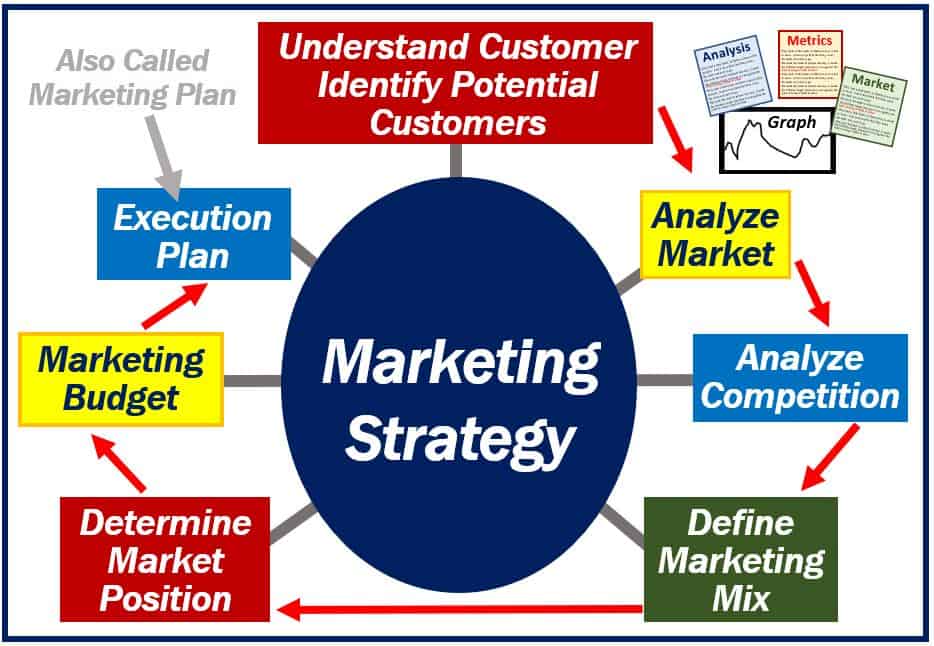A Marketing Strategy is all of a company’s marketing goals and objectives combined into a single comprehensive plan. Business executives draw a successful marketing strategy from market research. They also focus on the right product mix so that they can get the most profit.
Put simply; a marketing strategy is a strategy designed to promote a good or service and make a profit. In this context, the word ‘good‘ means the same as ‘product.’
A good marketing strategy helps companies identify their best customers. It also helps them understand consumers’ needs. With a good strategy, it is possible to implement the most effective marketing methods. A good real estate marketing plan, for example, requires extensive community engagement and personal networking.
To broaden your knowledge and widen the range of strategies you could implement, you should learn about CPA marketing, digital marketing, word of mouth marketing, and relationship marketing.
Marketing strategy is long-term
Marketing strategies are long-term, forward-looking approaches to planning. Their fundamental goal is to achieve a competitive advantage.
When a company has an edge over a rival or rivals in the provision of a product or service, it has a competitive advantage. Mercedes, for example, has a competitive advantage over other luxury car-makers because its vehicles maintain their value.
Mercedes did not obtain this competitive advantage overnight or because it was lucky. It was part of the company’s long-term strategy. Specifically, part of its marketing strategy.

Marketing strategy vs. marketing plan
Many people use the two terms interchangeably, but their meanings are quite different.
Marketing strategy
This includes an explanation of the goals a company needs to achieve with its marketing efforts. A company’s business goals shape its strategy.
Every business’ business goals and marketing strategy should go hand-in-hand.
Marketing plan
A business’ marketing plan describes how it is going to achieve its marketing goals.
Therefore, in marketing, the strategy describes the ‘what‘ while the plan describes the ‘how.’
Unfortunately, many people try to achieve the ‘how’ without first determining what the ‘what’ is.
You should first determine ‘what’ you want to achieve, and then work out ‘how’ you will do it. In other words, your marketing strategy must come before your marketing plan.
Before I decide, for example, whether to travel on foot or horseback, I need to determine where I want to go.
Creating a marketing strategy
Below is a list of important elements when it comes to creating a marketing strategy as well as a brief explanation of what they involve:
Segmentation
A company’s current and potential customers fall into specific segments or groups. You need to characterize them according to their needs.
You can identify these groups plus their needs through market reports and market research. As soon as you know what they are, you need to address those needs more effectively than your rivals. You also need to address consumers’ expectations.
Targeting and positioning
You must target the market segments that represent the greatest profits for your business. What your product or service offers must meet the needs and expectations of the target market you have selected.
Your marketing strategy must make the most of your strengths. It must also satisfy the needs and meet the expectations of your target segment.
Promotional tactics
When you have designed your marketing strategy, you need to decide how to make sure your target segment knows about your product or service. You must also tell them why and how your product can meet their needs.
You can do this via advertisements, public relations campaigns, exhibitions, and Internet marketing. Internet marketing means the same as digital marketing, i.e., online marketing.
Monitoring, assessment, and evaluation
You must monitor and evaluate or assess your strategy. It is important. Unfortunately, many people in business skip this part.
Monitoring and evaluation help companies see how well their strategy is performing. It also helps them devise a future marketing strategy. In other words, it has both short- and long-term benefits.
Your strategy comes before your plan
As soon as you have determined what your marketing strategy is, you can draw up a marketing plan. The plan describes how you are going to execute your strategy. It also shows how you will evaluate its effectiveness or success.
Huge choice of options
When deciding what to include in your marketing strategy, there are dozens of options. Here is a list of some of them:
- Content Marketing: Uses content to attract and convert prospects.
- Inbound Marketing: Attracts customers through various online channels.
- Social Media Marketing: Builds brand and sales through social platforms.
- SEO: Enhances online content for better search engine ranking.
- PPC: Advertisers pay for each ad click.
- Affiliate Marketing: Rewards for referrals or sales.
- Viral Marketing: Spreads product info rapidly online.
- Influencer Marketing: Uses influential figures who have many followers for promotion.
- Direct Marketing: Directly communicates with potential customers.
- Email Marketing: Sends targeted promotional messages.
- Guerrilla Marketing: Unconventional, resourceful promotional methods.
- PR: Manages public information to shape image.
- Word of Mouth: Encourages organic product discussions.
- Relationship Marketing: Nurtures long-term customer loyalty.
- Cause Marketing: Aligns with causes for mutual benefit.
- Event Marketing: Promotes through organized events.
Video explanation
